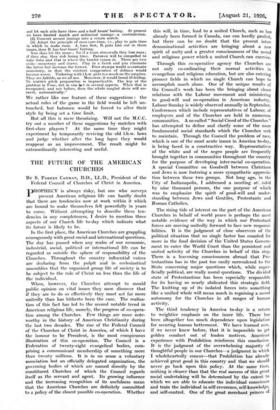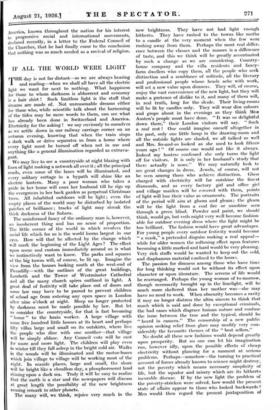THE FUTURE OF THE AMERICAN CHURCHES
BY S. PARKES CADMAN, D.D., LL.D., President of the Federal Council of Churches of Christ in America.
pROPHECY is always risky, but one who surveys present American religious life can hardly doubt that there are tendencies now at work within it which are bound to make themselves felt powerfully in years to come. Without attempting to describe these ten- dencies in any completeness, I desire to mention three aspects of our Church life to-day which indicate what its future is likely to be.
In the first place, the American Churches are grappling courageously with great social and international questions. The day has passed when any realm of our economic, industrial, social, political or international life can be regarded as outside the sphere of responsibility of the Churches. Throughout the country influential voices are declaring from the pulpit and in ecclesiastical assemblies that the organized group life of society is to be subject to the rule of Christ no less than the life of the individual.
When, however, the Churches attempt to mould public opinion on vital issues they soon discover that if they are to do so effectively they must act far more unitedly than has hitherto been the case. The realiza- tion of this fact has led to the second notable trend in American religious life, namely, the progress of co-opera- tion among the Churches. Few things are more note- worthy in the history of American Christianity during the last two decades. The rise of the Federal Council of the Churches of Christ in America, of which I have the honour to be President, is the most conspicuous illustration of this co-operation. The Council is a Federation of twenty-eight evangelical bodies, com- prising a communicant membership of something more than twenty millions. It is in no sense a voluntary association but an officially delegated organization, the governing bodies of which are named directly by the constituent Churches of which the Council regards itself as the servant and agent. Its growing influence and the increasing recognition of its usefulness mean that the American Churches are definitely committed to a policy of the closest possible co-operation. Whether this will, in time, lead to a united Church, such as has already been formed in Canada, one can hardly predict, but there can be no doubt that the present inter- denominational activities are bringing about a new spirit of unity and a greater consciousness of the moral and religious power which ,a united Church can exercise.
Through this co-operative agency the Churches are not only co-ordinating their normal activities in evangelism and religious education, but are also entering pioneer fields in which no single Church can hope to accomplish much alone. One of the unique results of the Council's work has been the bringing about closer relations with the Labour movement and ministering to good-will and co-operation in American industry. Labour Sunday is widely observed annually in September. Conferences which include representatives of Labour, of employers and of the Churches are held in numerous communities. A so-called "Social Creed of the Churches" has attempted to define and clarify some of the more fundamental social standards which the Churches seek to maintain. Through the Council the problem of race, which is one of the most acute issues in America to-day, is being faced in a constructive way. Representatives of the white and of the negro people are frequently brought together in communities throughout the country for the purpose of developing inter-racial co-operation. A special Committee on Goodwill between Christians and Jews is now fostering a more sympathetic apprecia- tion between these two groups. Not long ago, in the City of Indianapolis, I addressed a meeting at:_nded by nine thousand persons, the one purpose of which was to emphasize the spirit of good-will and under- standing between Jews and Gentiles, Protestants and Roman Catholics.
The rising tide of interest on the part of the American Churches in behalf of world peace is perhaps the most notable evidence of the way in which our Protestant forces are moving unitedly forward to face new responsi- bilities. It is the judgment of close observers of the political situation that no single factor has counted for more in the final decision of the United States Govern- ment to enter the World Court than the persistent and united activity of the Churches in behalf of this step. There is a leavening consciousness abroad that Pro- testantism has in the past too easily surrendered to the State concerning major questions which, while super- ficially political, are really moral questions. The divided state of Protestantism has been especially responsible for its having so nearly abdicated this strategic field. The knitting up of its isolated forces into something like a unified whole will mean much in regaining a moral autonomy for the Churches in all ranges of human activity.
The third tendency in America to-day is a return to weightier emphasis on the inner life. There has been altogether too much dependence upon legislation for securing human betterment. We have learned now, if we never knew before, that it is impossible to get golden conduct out of leaden motives. American experience with Prohibition reinforces this conclusion. It is the judgment of the overwhelming majority of thoughtful people in our Churches—a judgment in which I wholeheartedly concur—that Prohibition has already achieved great good in this country and that we should never go back upon this policy. At the same time, nothing is clearer than that the real success of this great social undertaking will be determined by the extent to which we are able to educate the individual conscience and train the individual in self-reverence, self-knowledge, and self-control. One of the great merchant princes of America, known throughout the nation for his interest in progressive social and international movements, declared recently, in a letter to the Federal Council of the Churches, that he had finally come to the conclusion that nothing was so much needed as a revival of religion.



































 Previous page
Previous page